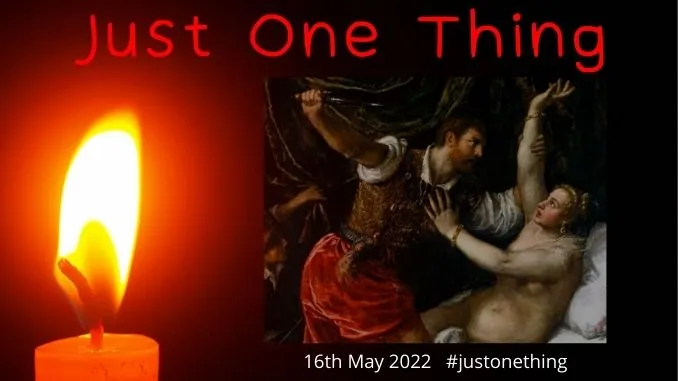
Daily Prompt: Guest
Who was the "woeful hostess" in the title of today's blog post, why was she "woeful," and who were the "merry guests"?
No, the "merry guests" were not my pals and I on Saturday night, though we were certainly "merry guests" at the hostelries that hosted our revelry as you can see from some of the photos that popped up on Facebook earlier today:

And there were no "woeful hostesses" in evidence all evening. Indeed, our first host, the man in black on the left in the above photo, was a cheerful chap who spoke excellent English.
In the next photo we are at our second party where our Okinawan hosts gamely brooked our merriment:

At the end of the evening our Okinawan host (centre), no doubt relieved to see the back of his guests, gracefully agreed to pose with us for a parting shot:

So, who was the "woeful hostess"?
The "woeful hostess" was a virtuous ancient Roman noblewoman called Lucretia, or "Lucrece" as she was known by our Chaucer and our Shakespeare.
The line in question comes from one of the verses in Shakespeare's early (1594) narrative poem, "The Rape of Lucrece."
Why was she "woeful"?
Lucrece was woeful because her hospitality in taking in an unexpected guest, Sextus Tarquinius, a Roman prince and friend of her husband, had been rewarded by his raping her in the dead of night before making good his escape.
Sextus had been inflamed by desire for the lady after hearing her husband boasting of her virtue around an army camp fire during the siege of an enemy city.
Sextus secretly leaves the siege and gallops back to Rome to visit the saintly lady who "guiltless... gives good cheer" by inviting him in:
This earthly saint, adored by this devil,
Little suspecteth the false worshipper;
For unstain'd thoughts do seldom dream on evil;
Birds never limed no secret bushes fear:
So guiltless she securely gives good cheer
And reverend welcome to her princely guest,
Whose inward ill no outward harm express'd...
Who are the "merry guests"?
They are "little birds" that have started singing in the early morning and it is their merriment that the ravished Lucrece cannot brook:
'You mocking-birds,' quoth she, 'your tunes entomb
Within your hollow-swelling feather'd breasts,
And in my hearing be you mute and dumb:
My restless discord loves no stops nor rests;
A woeful hostess brooks not merry guests...
In the founding mythology of Ancient Rome, it is this rape of a virtuous noblewoman by a prince that so outrages the Romans that they expel the Tarquins, abolish the monarchy and found the Republic.
And the rest is history - or legend.
David Hurley
P. S. Here is a rather fine oration of the poem:
Text of The Rape of Lucrece: https://www.thecompleteworksofshakespeare.com/poetry/the-rape-of-lucrece
Wikipedia Page: https://en.wikipedia.org/wiki/The_Rape_of_Lucrece
Photo source: en.wikipedia.org/wiki/The_Rape_of_Lucrece#/media/File:Tizian_094.jpg
